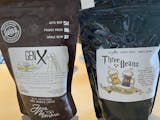Common Tea Questions
Not including health benefits and flavor questions, there are a handful of questions we think your Java Momma Customers may ask. This lesson will attempt to identify and answer these common questions.
How long is tea good for?
The good news is that tea, if properly stored away from air, light and moisture, will never spoil. That said, tea will gradually lose its flavor over time. Most teas are seasonal and therefore picked during a specific growing season each year. The further they are off plucking date, the less fresh they become.
Green and white teas depend on their essential oil content for flavor and will fade the fastest, generally within six months to a year. Black teas, however, rely on complex polyphenols for flavor, which atrophy at a much slower rate. They are good for at least year, sometimes two, three or more.
As a general rule, the larger the leaf and more tightly rolled the tea (e.g oolongs), the longer it will stay fresh. Smaller and broken leaf teas simply allow more of the leaf to contact the air and therefore grow stale faster.
A typical 2 oz. bag of tea can provide about 20-25 cups if they're using 1 tsp per 8 ounces, and re-using the tea. Remember that loose leaf tea can and should be used more than once, not like the teabags where you dump and go. Depending on how frequently the person drinks tea, it can last them a month or 6.
How do I store tea?
The key is to avoid moisture, excessive heat, light, air, and strong, competing aromas (which may be absorbed by the tea). Each of these will degrade the quality of your leaves. Your best bet is any opaque, airtight container in a cool, dry place. Because of the danger of scents, the spice cabinet or next to the coffee beans, while common and convenient, is probably a bad place for tea.
Should I refrigerate my tea?
We do not recommend keeping tea in the refrigerator. Some prized Green and Oolong teas are refrigerated by the growers, distributors and retailers, but the teas are vacuum packed and their refrigerators are specialized for this purpose. Your kitchen refrigerator is home to a host of food scents. Most importantly, the first time you open a container full of chilled tea and the outside air swooshes in, the moisture of the air will condense on those leaves. Whether you can see it or not, you are adding more moisture to the leaf by keeping it in the refrigerator than at room temperature. A good rule of thumb may be that long-term refrigerated storage of a sealed container is a great idea, but daily storage of a tea you access regularly is discouraged.
What causes iced teas to "cloud"?
Clouding occurs when the polyphenols (antioxidants) in tea bind with the minerals in the water. The effect is heightened when hot tea is iced quickly. This cloudiness has no impact on the taste, and is actually proof that your tea is chock-full of healthy stuff. In fact, in the search for teas that do not cloud (e.g. Lipton), many commercial iced teas have far fewer antioxidants than you might expect.
Should I use fresh water in my kettle? Can I reboil using the same water?
The jury's still out on this one. Some claim that the oxygen released by boiling water (seen as steam rushing out of a kettle) makes the remaining water more mineral dense and "hard." Others claim that this effect is negated immediately when water cools from a boil and oxygen resettles into the water. Some even recommend continually boiling water to get out its CO2 content and reduce its acidity. There are many schools of thought but to date, there has been no scientific evidence that the oxygen content in water contributes to a tea's flavor. To be sure, it's recommended to fetch fresh water but ultimately it's up to you.
Can I brew with the kettle? Do I put the tea leaves in the water as it's warming up?
Strictly speaking, you want to keep your leaves out of a kettle. There are two separate implements for tea brewing: a kettle and an infuser. Kettles are strictly for water and warming it up. Infusers (tea pots, strainers, tea balls, tea bags etc.) are for steeping tea. Warm your water to the correct temperature with a kettle, then pour that water into your teapot or cup with infuser.
Is it OK to use the microwave to heat my water?
Yes. Some will claim that microwaved water delivers less flavor, but we know of no scientific study proving this. The only downside is that the microwave makes it exceedingly difficult to determine the proper temperature. It also heats water very unevenly. At the end of the day, if you like the taste, there is no reason not to use a microwave. If your tea seems a little off, slow down and check your leaf quantity, water temperature and brewing time to identify whether it's the tea you don't like or if there is a hole in your process.
Should I cover my cup when I make tea?
Yes. It keeps your tea hot and therefore maintains the proper brewing temperature. Most importantly, however, it keeps the aromas from escaping. When professionally cupping teas, one of the most exciting parts of the experience is first opening that cupping set and inhaling the aroma of the hot, wet leaves. The strength of the aroma and nuance that can be detected by a good nose are absolutely incredible! Since a significant portion of taste is actually smell, keeping a lid on it will usually stew the flavor of those first few precious sips.
Are Java Momma Teas Organic?
Yes and no, all of our teas are organic...technically. Our teas come directly from farmers, and to make them certified organic teas, the farmer would have to pay out of pocket for the certification. Being "certified" organic is also a rather complicated process. There are hundreds of different agencies internationally that certify products as organic. Each agency has different standards, and some certifications are accepted in one country, but not others. For example, some products considered organic by the European organic association will not be considered organic by the USDA. Fortunately, there is no significant scientific proof showing that it is dangerous to drink tea that is not organic.



